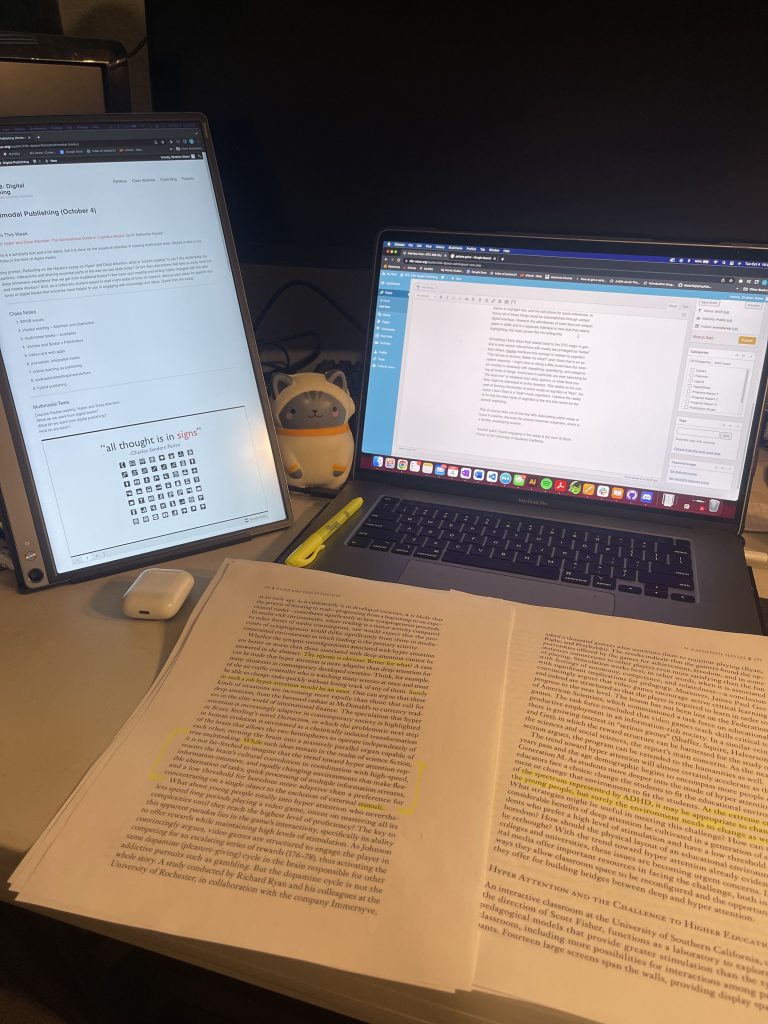Hayles bring up many interesting points in her article Hyper and Deep Attention: The Generational Gap in Cognitive Modes. I particularly appreciated her attention to AD/HD and how that can be viewed as a parallel to shifting patterns of cognition. (I also appreciated her footnote at the end explaining the difference between the old ADHD and AD/HD)
There is a specific aura associated with high academia, ivory tower, type institutions. There is the image of the frazzled undergrad passed out a library table, surrounded by a dozen reference books while they study for a final. This is the image I believe most individuals associate that image of intense study. Halyes describes that “deep attention … in academic settings is the defacto norm” This study of a single topic to the point of exhaustion is viewed as Real Learning (capitals because it’s very serious) and that there is something lost with other modes.
I think that hypermedia, interactivity, and sharing as components of a text are something that is become more popular but I would say it is essential or integral yet. There are tools like Perusall that work to create public annotations and discussions within a shared reading space, but these are third-party commercial tools, not integrated parts of the learning experience. For my personal study I tend to use a variety tools and interfaces including my laptop, physical copies to highlight text, and my cell phone for quick references. In theory all of those things could be accomplished through unified digital interface.
However the affordances of each item are unique; I am writing this on a laptop with the printed essay in front of me, I have a second screen displaying the prompt for reference, and I took the picture with my cell phone while texting a friend if we are going to meet on campus before class. All of these interfaces afford something unique but they are not all electronic, and frankly I think they fact they are not integrated is useful because it splits up the purpose of each item meaning the work done on each will be focused.
Something I think about that relates back to the DTC major in general is how certain interactions with media are privileged as “better” than others. Hayles mentions this concept in relation to cognition “The riposte is obvious: Better for what?” and I think that is an excellent response. I might stray to being a little broad here but western society is obsessed with classifying, quantifying, and categorizing all kinds of things. Americans in particular are ever searching for “the best one” of whatever tool, idea, opinion, or what have you they might be interested in at the moment. This relates to the concept of forming hierarchies of which mode of cognition is “best”, because I don’t think is a “best” mode cognitions. I believe the reality to be that the best mode of cognition is the one that works for the person cogitating.
This of course does not fit into line with determining which mode of focus is superior, because the answer becomes subjective, which is a terribly unsatisfying answer.
Overall I think that this essay addresses an important point about changing standards and modes of cognition and how those modes are formed in the first place. I was born in 1994, I got most of my K-12 education from books and papers, with a shift towards digital technology coming around the last 5 or so years I was in school. The bulk of my education since high school has been hybrid but I think the reality is that even the digital interfaces I have used for learning emulate the affordances of the book.
While there are some electronic elements, there isn’t much true interactivity to illustrate examples, no moving graphics to show scientific concepts, and no single interface that packages and presents all of these things together. Admittedly tablet computers such as the iPad are working towards this, those things remain luxury items and the alternatives have frustrating limitations. I think there is a great shift that has already happened and more coming in the ways that humans learn, teach, and interact with knowledge.

